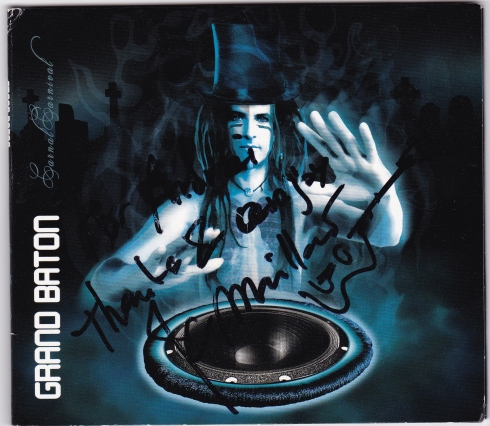This week The Music and Myth is venturing into new musical territory with a feature on Grand Baton’s 2013 release Carnal Carnival. A month ago I’ve had the opportunity to witness the profoundly gifted Sofia Rei in concert at the Wiener Konzerthaus. I’ve made no secret of my fondness for this musician. Her performances always possess an unearthly intensity and candor and that is owed as much to Sofia’s charisma and impassioned delivery as it is to the band’s commitment and virtuosity. One of her band members that evening was frequent collaborator, composer and multi-instrumentalist JC Maillard. I’d been familiar with JC only from his collaboration with Sofia. Since his talent and timing had been an integral part of the polish of their performance in Vienna, I decided to check out some of his other musical endeavors. I bought Carnal Carnival after the show and asked JC to sign it for me. When I told him I’m looking forward to playing the record he warned me that it’s “loud. It’s not like what I play with Sofia.” That would end up being the mother of all understatements.
Essentially a hybrid composition of rock and dubstep elements with the temperament of Caribbean carnival music and the “vocabulary of the Ka drum” – as the musician himself expressed it – Carnal Carnival is a testament to Maillard’s versatility as a songwriter and his dauntlessness in experimenting with and expanding on music with a long-established heritage.
The record is the third in Maillard’s longtime study of the “Ka” – the traditional drum from his birthplace of Guadalupe – as a melodic instrument. The ambitious tribute started with the praiseworthy Ka Suite, Maillard’s first solo record, before taking the shape of Grand Baton, a project that involves Thierry Arpino (drums) and Arnaud Dolmen & Olivier Juste (Ka drums) among others. Le Grand Baton was released in 2007 and distanced itself from the acoustic origins of Ka Suite with a sound that was firmly planted in the fertile soil of rock. In the same way, Carnal Carnival is starting to break away from rock and to experiment with pronounced elements of dubstep.
The album begins in a bit of an odd manner, with the ninety second-long “Welcome to the Carnival” which is more of a teaser for the closing track “Idemdito” than an actual intro for the album. It doesn’t hurt the record, but it also doesn’t add anything to its overall narrative at this point. With “Caribbean Raider” however, Carnal Carnival is already at full throttle. The most instantly captivating of the songs, this track is a great indication of what the listener can expect from the music: electrifying distorted guitars, hypnotic chant-like vocals and of course powerful percussion that creates an almost sentient rhythm. As a vocalist, Maillard is more shaman than singer. He makes wise use of his voice to create everything from mesmerizing incantations to eclectic falsetto yelps and barks. Though at particular times the lyrics do leave a bit to be desired, it doesn’t end up hurting the compositions since their role is to help induce a trance-like state rather than for straight up storytelling.
A track evidently designed for the dance floor, “Hands Up” delivers in spades. With a dynamic and unpredictable construction, vocals that switch from hypnotic and velvety to forceful and unrestrained and a concentrated dose of dubstep, the song exhibits the perfect balance between the timeless allegorical spirit of the carnival and the streamlined vibrations of modern electronic music. “L.O.V.E.L.F.O” attempts something similar but doesn’t manage to achieve the same results. However, the song is noteworthy for some killin’ Ka drums courtesy of Arnaud Dolmen and Olivier Juste. Speaking of awesome percussion, Carnal Carnival continues with “Tired of Myself” – in my opinion the highlight of the record. Everything just clicks on this song, from the fantastic percussion and extremely kinetic groove to the clever lyrics and outlandish singing.
“Drop Off Your Bags” is a dance floor diamond in the vein of “Hands Up” executed to psychedelic perfection while “Pa Di Mwen”, another one of the standouts, is a throwback to the rock resonance of Le Grand Baton, complete with lyrics in Haitian Creole and a deliciously distorted guitar solo towards the end, reminiscent of Marc Ribot in Ceramic Dog. At this point I have to also commend Thierry Arpino, whose drums are consistently captivating throughout the entire album. Clearly, all band members are exceedingly talented musicians, which adds a level of complexity most often lacking in electronic music. Another factor in the depth of the compositions is likely Maillard’s fascination with finding melody in percussion.
The record ends with “Idemdito”, an almost eight-minute long roller-coaster ride of sound effects, powerful drums, surprisingly melodic bridges and constant changes of pace – a very inspired closing track that seems to contain the defining elements of the rest of the songs all rolled into one. The fact that the last ninety seconds are basically “Welcome to the Carnival” creates a nice ouroboric narrative which is very fitting since Carnal Carnival – in spite of its “club music” form – is a meditative, culturally conscious work.
As a modern, urban work of music Grand Baton’s Carnal Carnival succeeds on every level. It’s a bold new approach to a deep-rooted musical heritage, a thoughtful tribute to the musicality of an instrument and ultimately just an all out entertaining album.
I could close the feature with big words and fancy metaphors but instead, I’m going to just quote what I said to JC on Facebook after having heard the album for the first time:
“Damn, I’m really enjoying Carnal Carnival! Awesome sound and attitude; it’s what I call a record with balls!”
Highly recommended by The Music and Myth!


